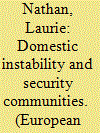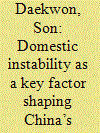|
|
|
Sort Order |
|
|
|
Items / Page
|
|
|
|
|
|
|
| Srl | Item |
| 1 |
ID:
071782


|
|
|
|
|
| Publication |
2006.
|
| Summary/Abstract |
The problem of political instability is neglected in the literature on security communities. In this article I argue that domestic stability, defined as the absence of large-scale violence in a country, is a necessary condition of these communities. Domestic violence precludes the existence of security communities because it renders people and states insecure; it creates the risk of cross-border destabilization and violence; and it generates uncertainty and tension among states, inhibiting trust and a sense of collective identity. I conclude that the benchmark of a security community-dependable expectations of peaceful change-should apply as much within states as between them. This is consistent with the work of Karl Deutsch, whose pioneering concept of a security community is widely understood to mean the absence of interstate war. Deutsch, in fact, was equally concerned with large-scale internal violence.
|
|
|
|
|
|
|
|
|
|
|
|
|
|
|
|
| 2 |
ID:
171080


|
|
|
|
|
| Summary/Abstract |
This study explores the domestic determinants of China’s intervention in the Korean War. Since the war, scholars have produced a large number of studies on the motivations behind China’s intervention in the war. These previous studies paid scant attention to domestic aspects, all of them assuming, albeit implicitly, that Party leaders could readily harness all available domestic resources and devote them to their political ends and that the public was willing to sacrifice their material resources and lives in order to satisfy the leaders’ political goals. By contrast, this study, based on extensive newly unearthed archival documents, argues that very unfavorable domestic circumstances helped shape the CCP’s strategy both before and after the outbreak of the Korean War. The domestic challenges not only provided the rationale for the CCP’s opposition to Kim Il-Sung’s Korean War plan before June 1950 but also gave an internal impetus for China’s vacillation in decision making and affected Mao’s final proactive decision to enter the war in October 1950.
|
|
|
|
|
|
|
|
|
|
|
|
|
|
|
|
| 3 |
ID:
128974


|
|
|
|
|
| Publication |
2013.
|
| Summary/Abstract |
The basic question this paper asks is how the domestic instability in China will affect external action.
China's society is undergoing a major change along with its economic growth, with various social
contradictions deepening, including gaps between the rich and the poor. These social contradictions
occasionally erupted in riots and demonstrations. Scholars have argued what sorts of external action
these developments would lead to, on which there are two camps of thought: (i) expansion, and (ii)
compromises. The problem is that for what reasons and through what mechanisms the domestic
instability would lead to external actions have not yet been fully clarified. Domestic instability does
not necessarily always influence external actions in all countries. There should be some conditions
in order for domestic instability to influence external actions. This paper argues that the intervening
variable that links domestic issues to external policy is the stability of the political system. From this
perspective, the current instability of China's political system is only limited and the likelihood that
domestic problems should be diverted to its external policy is not so high at the present stage. For
the moment at least, China is not in a situation where domestic instability would lead to hard-line
external policy, as suggested by diversionary theory. That is because the extent to which domestic
problems in China can make the political system itself unstable is limited. Meanwhile, regarding
the claim that China cannot compromise on external policy under the watchful eyes of the domestic
elite or society as a whole, as suggested by audience cost theory, there is both supporting and
negating evidence at present.
|
|
|
|
|
|
|
|
|
|
|
|
|
|
|
|
| 4 |
ID:
139293


|
|
|
|
|
| Summary/Abstract |
The importance of nuclear security in Asia needs to be focused upon in view of the emerging challenges of nuclear proliferation, growing nuclear arsenals, expanding civilian nuclear energy programmes, weak export controls, zones of domestic instability and terrorism in several regions within the continent. This article focuses on the factors that pose potential risks to nuclear security in Asia. It emphasises the prevailing factors endangering the security of nuclear and radiological materials in Asia. The article stresses the need to strengthen nuclear security in Asia and reinforce effective nuclear security worldwide.
|
|
|
|
|
|
|
|
|
|
|
|
|
|
|
|
| 5 |
ID:
059981


|
|
Sudan
/ Sidahmed, Abdel Salam ; Sidahmed, Alsir
|
2005

|
|
|
|
| Publication |
Abingdon, Routledge, 2005.
|
| Description |
xxviii, 180p.hbk
|
| Series |
Contemporary Middle East
|
| Standard Number |
0415274176
|
|
|
|
|
|
|
|
|
|
|
|
Copies: C:1/I:0,R:0,Q:0
Circulation
| Accession# | Call# | Current Location | Status | Policy | Location |
| 049329 | 962.404/SID 049329 | Main | On Shelf | General | |
|
|
|
|
|
|
|
|
|